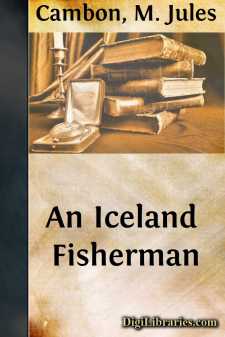Categories
- Antiques & Collectibles 13
- Architecture 36
- Art 48
- Bibles 22
- Biography & Autobiography 813
- Body, Mind & Spirit 142
- Business & Economics 28
- Children's Books 14
- Children's Fiction 11
- Computers 4
- Cooking 94
- Crafts & Hobbies 4
- Drama 346
- Education 46
- Family & Relationships 57
- Fiction 11829
- Games 19
- Gardening 17
- Health & Fitness 34
- History 1377
- House & Home 1
- Humor 147
- Juvenile Fiction 1873
- Juvenile Nonfiction 202
- Language Arts & Disciplines 88
- Law 16
- Literary Collections 686
- Literary Criticism 179
- Mathematics 13
- Medical 41
- Music 40
- Nature 179
- Non-Classifiable 1768
- Performing Arts 7
- Periodicals 1453
- Philosophy 64
- Photography 2
- Poetry 896
- Political Science 203
- Psychology 42
- Reference 154
- Religion 513
- Science 126
- Self-Help 84
- Social Science 81
- Sports & Recreation 34
- Study Aids 3
- Technology & Engineering 59
- Transportation 23
- Travel 463
- True Crime 29
An Iceland Fisherman
by: M. Jules Cambon
Description:
Excerpt
PIERRE LOTI
The first appearance of Pierre Loti's works, twenty years ago, caused a sensation throughout those circles wherein the creations of intellect and imagination are felt, studied, and discussed. The author was one who, with a power which no one had wielded before him, carried off his readers into exotic lands, and whose art, in appearance most simple, proved a genuine enchantment for the imagination. It was the time when M. Zola and his school stood at the head of the literary movement. There breathed forth from Loti's writings an all-penetrating fragrance of poesy, which liberated French literary ideals from the heavy and oppressive yoke of the Naturalistic school. Truth now soared on unhampered pinions, and the reading world was completely won by the unsurpassed intensity and faithful accuracy with which he depicted the alluring charms of far-off scenes, and painted the naive soul of the races that seem to endure in the isles of the Pacific as surviving representatives of the world's infancy.
It was then learned that this independent writer was named in real life Louis Marie Julien Viaud, and that he was a naval officer. This very fact, that he was not a writer by profession, added indeed to his success. He actually had seen that which he was describing, he had lived that which he was relating. What in any other man would have seemed but research and oddity, remained natural in the case of a sailor who returned each year with a manuscript in his hand. Africa, Asia, the isles of the Pacific, were the usual scenes of his dramas. Finally from France itself, and from the oldest provinces of France, he drew subject-matter for two of his novels, An Iceland Fisherman and Ramuntcho. This proved a surprise. Our Breton sailors and our Basque mountaineers were not less foreign to the Parisian drawing-room than was Aziyade or the little Rahahu. One claimed to have a knowledge of Brittany, or of the Pyrenees, because one had visited Dinard or Biarritz; while in reality neither Tahiti nor the Isle of Paques could have remained more completely unknown to us.
The developments of human industry have brought the extremities of the world nearer together; but the soul of each race continues to cloak itself in its own individuality and to remain a mystery to the rest of the world. One trait alone is common to all: the infinite sadness of human destiny. This it was that Loti impressed so vividly on the reading world.
His success was great. Though a young man as yet, Loti saw his work crowned with what in France may be considered the supreme sanction: he was elected to membership in the French Academy. His name became coupled with those of Bernardin de St. Pierre and of Chateaubriand. With the sole exception of the author of Paul and Virginia and of the writer of Atala, he seemed to be one without predecessor and without a master. It may be well here to inquire how much reason there is for this assertion, and what novel features are presented in his work.
It has become a trite saying that French genius lacks the sense of Nature, that the French tongue is colourless, and therefore wants the most striking feature of poetry....


